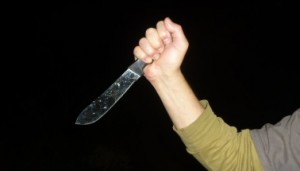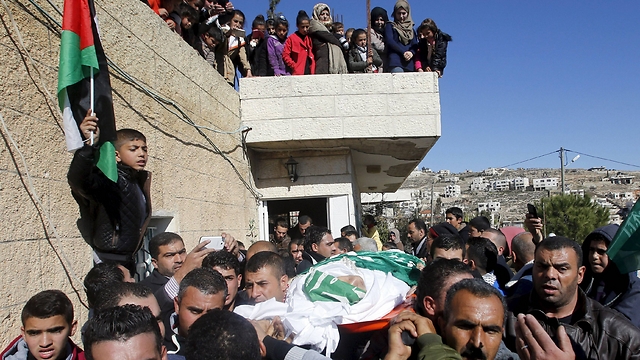
Citing security concerns, Israel is still holding onto about a dozen Palestinian terrorist bodies, whereas their families claim this measure provokes anger & inflames the atmosphere even more.
By The Associated Press
Palestinian families are pressing Israel to return about a dozen terrorist bodies that Israel continues to hold since a wave of terror began about four months ago.

Palestinian funeral near Hebron – Photo: Reuters
The son still has not been buried – one of about a dozen bodies of Palestinian terrorists that Israel continues to hold nearly four months after a wave of violence erupted in Jerusalem and spread across Israel and the West Bank.
Israel says it is holding the bodies due to security concerns, but Palestinians say the measure is stoking anger and worsening the atmosphere. Islam, like Judaism, requires swift burial of the dead.
“Every time I sit next to the heater and I feel warm, I imagine my son in the refrigerator,” said Oweisat, toasting his hands over an electric heater in a drafty home in east Jerusalem.
The current terror wave broke out in mid-September, fueled by rumors that Israel was plotting to take over a sensitive Jerusalem site that is holy to Jews and Muslims. Israel has said there are no plans to change the sensitive arrangements at the hilltop compound, revered by Jews as the location of the biblical Temples and which today houses the al-Aqsa Mosque.
At the outset of the violence, Israel’s public security minister, Gilad Erdan, recommended holding on to the bodies of Palestinian assailants, claiming the funerals turn into “an exhibition of support for terror and incitement to murder.”
The issue has become a sore point with Palestinians. Posters of the dead are plastered on walls in East Jerusalem and the West Bank, and residents hold frequent demonstrations calling for the release of the bodies.
On Tuesday, Israeli riot police used stun grenades to break up a demonstration in Jerusalem by dozens of Palestinians calling on Israel to return the bodies of their relatives.
The issue “has surpassed al-Aqsa as the main rallying cry of many of the protests in Jerusalem and Hebron,” said Nathan Thrall, an analyst with the International Crisis Group, referring to the two main flashpoints of violence.
Palestinians have said Israel has placed conditions on the return of bodies, demanding they hold small nighttime funerals and provide cash deposits to guarantee their compliance. The Israeli police, military and Public Security Ministry all declined to comment on why Israel has continued to hold the bodies for so long or the criteria for their release.
But an Israeli official familiar said the overall policy has been aimed at “de-escalation.” He said the delays have a deterrent effect among potential attackers who dream of being honored with large funerals. The official, speaking on condition of anonymity because he was discussing internal policy discussions, said releases are decided “case by case” based on security assessments.
Last week, Israel released the bodies of nearly two dozen Palestinians in the West Bank. A mass funeral for 17 of them in the volatile city of Hebron on Saturday passed without incident. Early Tuesday, Israel released another three bodies, which were buried on the outskirts of Jerusalem after funerals attended by hundreds. There were no reports of unrest.
Eitan Dangot, a retired Israeli general who served until 2014 as the head of COGAT, the Israeli defense body responsible for Palestinian civilian issues, said the release reflected a more relaxed atmosphere in the West Bank. He compared Saturday’s funeral with a funeral for five Palestinian teens on Oct. 31 in Hebron that devolved into clashes with Israeli troops. “The conditions are more ripe at the moment,” Dangot said.
In the Jerusalem neighborhood of Silwan, residents say they raced to bury Ayman Abbassi, a 17-year-old killed in an evening clash with Israeli forces in November.
Police say Abbassi was shot after he threw a firebomb at Israeli forces. When he was pronounced dead at a clinic, friends sped to the family home, wrapped the body in a Palestinian flag and buried him in an old cemetery after midnight to prevent the Israelis from taking his body to a morgue.
“People come back from there as a chunk of ice,” his brother Anwar Abbassi said. “It was a big relief to bury him.”
Attorney Mohammed Elayan’s son Bahaa, 22, opened fire on a Jerusalem bus in mid-October, killing three Israelis before he was killed. Since then, Elayan has been leading a campaign to recover the bodies of his son and others, earning him the nickname “Father of the Martyrs.”
He said last week’s release of the bodies in Hebron was a significant accomplishment. “We forced the Israelis to release the bodies without conditions,” he said.
As of Tuesday, Elayan, 60, said he still had not recovered his son’s body. He said he refused Israeli demands that he bury Bahaa at night without a funeral procession, and post a $1,300 deposit.
On Monday, Israeli forces demolished Elayan’s home. Israel says such moves deter other potential attackers. But Elayan, 60, said he believed the demolition was retribution for his activities.
“If you bury the bodies in five minutes, their families go home,” Alayan said. “Now people have been in the streets for 85 days . I thank the Israelis for giving us this momentum.”
View original Ynet publication at:
http://www.ynetnews.com/articles/0,7340,L-4749453,00.html






 Israeli New Shekel Exchange Rate
Israeli New Shekel Exchange Rate